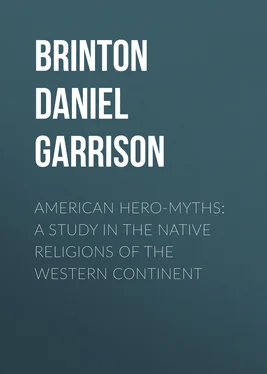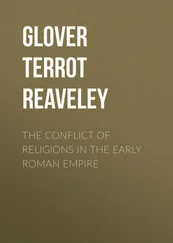Daniel Brinton - American Hero-Myths - A Study in the Native Religions of the Western Continent
Здесь есть возможность читать онлайн «Daniel Brinton - American Hero-Myths - A Study in the Native Religions of the Western Continent» — ознакомительный отрывок электронной книги совершенно бесплатно, а после прочтения отрывка купить полную версию. В некоторых случаях можно слушать аудио, скачать через торрент в формате fb2 и присутствует краткое содержание. Жанр: foreign_prose, История, Мифы. Легенды. Эпос, foreign_edu, foreign_antique, на английском языке. Описание произведения, (предисловие) а так же отзывы посетителей доступны на портале библиотеки ЛибКат.
- Название:American Hero-Myths: A Study in the Native Religions of the Western Continent
- Автор:
- Жанр:
- Год:неизвестен
- ISBN:нет данных
- Рейтинг книги:4 / 5. Голосов: 1
-
Избранное:Добавить в избранное
- Отзывы:
-
Ваша оценка:
- 80
- 1
- 2
- 3
- 4
- 5
American Hero-Myths: A Study in the Native Religions of the Western Continent: краткое содержание, описание и аннотация
Предлагаем к чтению аннотацию, описание, краткое содержание или предисловие (зависит от того, что написал сам автор книги «American Hero-Myths: A Study in the Native Religions of the Western Continent»). Если вы не нашли необходимую информацию о книге — напишите в комментариях, мы постараемся отыскать её.
American Hero-Myths: A Study in the Native Religions of the Western Continent — читать онлайн ознакомительный отрывок
Ниже представлен текст книги, разбитый по страницам. Система сохранения места последней прочитанной страницы, позволяет с удобством читать онлайн бесплатно книгу «American Hero-Myths: A Study in the Native Religions of the Western Continent», без необходимости каждый раз заново искать на чём Вы остановились. Поставьте закладку, и сможете в любой момент перейти на страницу, на которой закончили чтение.
Интервал:
Закладка:
Daniel G. Brinton
American Hero-Myths: A Study in the Native Religions of the Western Continent
PREFACE
This little volume is a contribution to the comparative study of religions. It is an endeavor to present in a critically correct light some of the fundamental conceptions which are found in the native beliefs of the tribes of America.
So little has heretofore been done in this field that it has yielded a very scanty harvest for purposes of general study. It has not yet even passed the stage where the distinction between myth and tradition has been recognized. Nearly all historians continue to write about some of the American hero-gods as if they had been chiefs of tribes at some undetermined epoch, and the effort to trace the migrations and affiliations of nations by similarities in such stories is of almost daily occurrence. How baseless and misleading all such arguments must be, it is one of my objects to set forth.
At the same time I have endeavored to be temperate in applying the interpretations of mythologists. I am aware of the risk one runs in looking at every legend as a light or storm myth. My guiding principle has been that when the same, and that a very extraordinary, story is told by several tribes wholly apart in language and location, then the probabilities are enormous that it is not a legend but a myth, and must be explained as such. It is a spontaneous production of the mind, not a reminiscence of an historic event.
The importance of the study of myths has been abundantly shown of recent years, and the methods of analyzing them have been established with satisfactory clearness.
The time has long since passed, at least among thinking men, when the religious legends of the lower races were looked upon as trivial fables, or as the inventions of the Father of Lies. They are neither the one nor the other. They express, in image and incident, the opinions of these races on the mightiest topics of human thought, on the origin and destiny of man, his motives for duty and his grounds of hope, and the source, history and fate of all external nature. Certainly the sincere expressions on these subjects of even humble members of the human race deserve our most respectful heed, and it may be that we shall discover in their crude or coarse narrations gleams of a mental light which their proud Aryan brothers have been long in coming to, or have not yet reached.
The prejudice against all the lower faiths inspired by the claim of Christianity to a monopoly of religious truth–a claim nowise set up by its founder–has led to extreme injustice toward the so-called heathen religions. Little effort has been made to distinguish between their good and evil tendencies, or even to understand them. I do not know of a single instance on this continent of a thorough and intelligent study of a native religion made by a Protestant missionary.
So little real work has been done in American mythology that very diverse opinions as to its interpretation prevail among writers. Too many of them apply to it facile generalizations, such as "heliolatry," "animism," "ancestral worship," "primitive philosophizing," and think that such a sesame will unloose all its mysteries. The result has been that while each satisfies himself, he convinces no one else.
I have tried to avoid any such bias, and have sought to discover the source of the myths I have selected, by close attention to two points: first, that I should obtain the precise original form of the myth by a rigid scrutiny of authorities; and, secondly, that I should bring to bear upon it modern methods of mythological and linguistic analysis.
The first of these requirements has given me no small trouble. The sources of American history not only differ vastly in merit, but many of them are almost inaccessible. I still have by me a list of books of the first order of importance for these studies, which I have not been able to find in any public or private library in the United States.
I have been free in giving references for the statements in the text. The growing custom among historians of omitting to do this must be deplored in the interests of sound learning. It is better to risk the charge of pedantry than to leave at fault those who wish to test an author's accuracy or follow up the line of investigation he indicates.
On the other hand, I have exercised moderation in drawing comparisons with Aryan, Semitic, Egyptian and other Old World mythologies. It would have been easy to have noted apparent similarities to a much greater extent. But I have preferred to leave this for those who write upon general comparative mythology. Such parallelisms, to reach satisfactory results, should be attempted only by those who have studied the Oriental religions in their original sources, and thus are not to be deceived by superficial resemblances.
The term "comparative mythology" reaches hardly far enough to cover all that I have aimed at. The professional mythologist thinks he has completed his task when he has traced a myth through its transformations in story and language back to the natural phenomena of which it was the expression. This external history is essential. But deeper than that lies the study of the influence of the myth on the individual and national mind, on the progress and destiny of those who believed it, in other words, its true religious import. I have endeavored, also, to take some account of this.
The usual statement is that tribes in the intellectual condition of those I am dealing with rest their religion on a worship of external phenomena. In contradiction to this, I advance various arguments to show that their chief god was not identified with any objective natural process, but was human in nature, benignant in character, loved rather than feared, and that his worship carried with it the germs of the development of benevolent emotions and sound ethical principles.
Media, Pa., Oct., 1882.
CHAPTER I.
INTRODUCTORY
SOME KIND OF RELIGION FOUND AMONG ALL MEN–CLASSIFICATIONS OF RELIGIONS–THE PURPOSE OF RELIGIONS–RELIGIONS OF RITE AND OF CREED–THE MYTH GROWS IN THE FIRST OF THESE–INTENT AND MEANING OF THE MYTH.
PROCESSES OF MYTH-BUILDING IN AMERICA–PERSONIFICATION. PARONYMS AND HOMONYMS–OTOSIS–POLYONOMY–HENOTHEISM–BORROWING–RHETORICAL FIGURES–ABSTRACT EXPRESSIONS. ESOTERIC TEACHINGS.
OUTLINES OF THE FUNDAMENTAL AMERICAN MYTH–THE WHITE CULTURE-HERO AND THE FOUR BROTHERS–INTERPRETATION OF THE MYTH–COMPARISON WITH THE ARYAN HERMES MYTH–WITH THE ARYO-SEMITIC CADMUS MYTH–WITH OSIRIAN MYTHS–THE MYTH OF THE VIRGIN MOTHER–THE INTERPRETATION THUS SUPPORTED.
The time was, and that not so very long ago, when it was contended by some that there are tribes of men without any sort of religion; nowadays the effort is to show that the feeling which prompts to it is common, even among brutes.
This change of opinion has come about partly through an extension of the definition of religion. It is now held to mean any kind of belief in spiritual or extra-natural agencies. Some learned men say that we had better drop the word "religion," lest we be misunderstood. They would rather use "daimonism," or "supernaturalism," or other such new term; but none of these seems to me so wide and so exactly significant of what I mean as "religion."
All now agree that in this very broad sense some kind of religion exists in every human community. [1] [ Footnote 1 : I suppose I am not going too far in saying "all agree;" for I think that the latest study of this subject, by Gustav Roskoff, disposes of Sir John Lubbock's doubts, as well as the crude statements of the author of Kraft und Stoff , and such like compilations. Gustav Roskoff, Das Religionswesen der Rohesten Naturvölker , Leipzig, 1880.] [ Footnote 2 : J. Hammond Trumbull, On the Composition of Indian Geographical Names , p. 3 (Hartford, 1870).] [ Footnote 3 : "El ser existente de hombre, que es el modo de estar el primer ser que es la essentia que en Dios y los Angeles y el hombre es modo personal." Diego Gonzalez Holguin, Vocabvlario de la Lengva Qqichua, o del Inca; sub voce, Cay . (Ciudad de los Reyes, 1608.)] [ Footnote 4 : Franco, Noticia de los Indios Guaymies y de sus Costumbres , p. 20, in Pinart, Coleccion de Linguistica y Etnografia Americana . Tom. iv.] [ Footnote 5 : Sir George W. Cox, An Introduction to the Science of Comparative Mythology and Folk-Lore , p. 17.] [ Footnote 6 : Sir George W. Cox, Ibid. , p. 76.] [ Footnote 7 : See Dr. C.P. Tiele, History of the Egyptian Religion , pp. 93, 95, 99, et al.] [ Footnote 8 : "Τον εμον Χιτωνα ουδεις απεχαλυφεν ον εγω χαρπον ετεχαν, ηλιος εγενετο." (Greek: Ton emon chitona oudeis apechaluphen on ego charpon etechan, aelios egeneto.)]" Proclus, quoted by Tiele, ubi suprá, p. 204, note.]
Интервал:
Закладка:
Похожие книги на «American Hero-Myths: A Study in the Native Religions of the Western Continent»
Представляем Вашему вниманию похожие книги на «American Hero-Myths: A Study in the Native Religions of the Western Continent» списком для выбора. Мы отобрали схожую по названию и смыслу литературу в надежде предоставить читателям больше вариантов отыскать новые, интересные, ещё непрочитанные произведения.
Обсуждение, отзывы о книге «American Hero-Myths: A Study in the Native Religions of the Western Continent» и просто собственные мнения читателей. Оставьте ваши комментарии, напишите, что Вы думаете о произведении, его смысле или главных героях. Укажите что конкретно понравилось, а что нет, и почему Вы так считаете.







![Hubert Bancroft - The Native Races [of the Pacific states], Volume 5, Primitive History](/books/749157/hubert-bancroft-the-native-races-of-the-pacific-s-thumb.webp)



![Hubert Bancroft - The Native Races [of the Pacific states], Volume 1, Wild Tribes](/books/750126/hubert-bancroft-the-native-races-of-the-pacific-s-thumb.webp)
